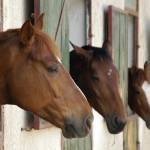Quarantine Horses to Prevent Illness

Contact with body fluids constitutes an important route of disease transmission. These fluids—saliva, pus, nasal secretions—can be picked up if horses touch noses or if the healthy horse puts its nose on something like a bucket, bit, fence board, or waterer where the sick horse has left contaminated body fluids. Coughing horses can spread disease, as can grooms who have attended to sick horses and then carry bacteria to healthy horses through dirty hands, clothes, or shoes.
Horses that are new to a farm and those that are returning from a show or event are the most likely to introduce disease on a property. These horses may have had immune system challenges because of the stress of travel and performance, and may not immediately show signs of illness in the first few days. In fact, some bacterial infections may take as long as three weeks between the time a horse is exposed and the first signs are seen.
The best way to prevent the spread of disease is to quarantine any arriving horse for two or three weeks, checking it for fever or other signs of illness. New horses should not share equipment, water buckets, or pastures with other horses, and attendants should wash their hands and change clothes after tending them. Quarantined horses should also be fed and cared for last. If this procedure is always followed, it is unlikely that other horses on the farm will become sick.
Realistically, total isolation of newly purchased or returning horses isn’t practical for many people who have only a few horses that share pastures and barns. In these cases, owners can take precautions that reduce the chance of spreading disease.
If possible, new horses should be kept at the opposite end of the barn from resident horses and should be turned out in separate paddocks. Consult with your veterinarian about which vaccinations are most useful to reduce disease risks.
Horses should be checked twice a day for an elevated temperature, as this is one of the first indications of illness. Other signs such as a runny nose, cough, lethargy, diarrhea, and changes in eating or drinking should be noted, and a veterinarian should check horses that show any of these signs. Owners or caretakers should be conscientious during this period to wash their hands after handling each horse and to avoid sharing tack, grooming tools, and buckets between horses.








